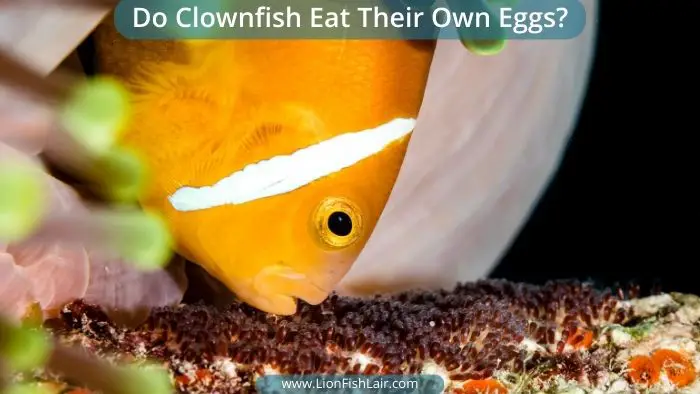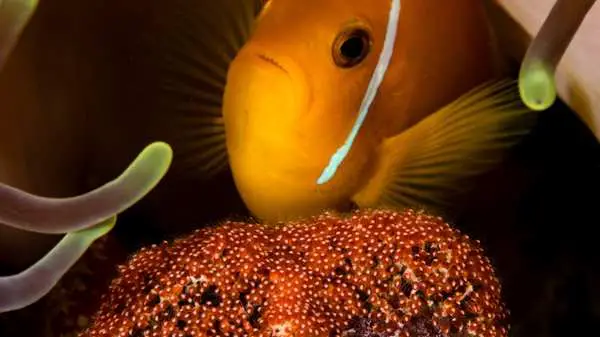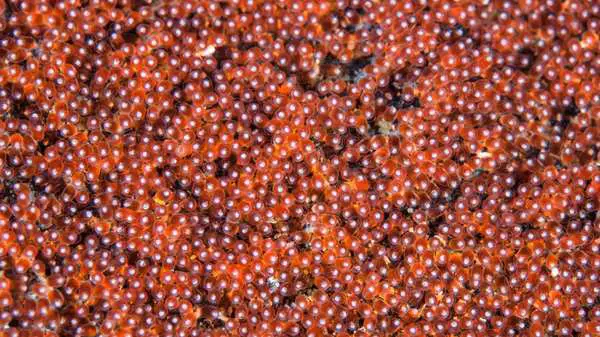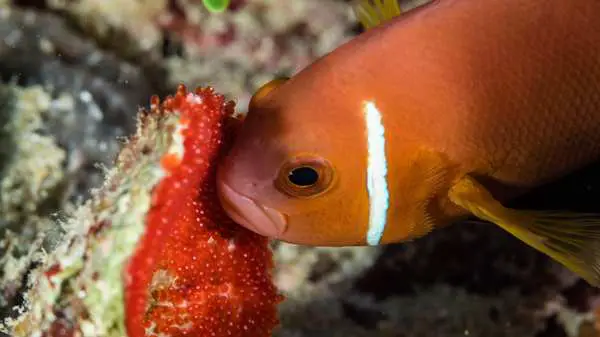Clownfish are undoubtedly one of, if not the most popular saltwater fish in the hobby, and I am sure you know why, so, no need to head down that road!
Due to their popularity, and the fact that they are extremely hardy and beginner-friendly fish, many people become intrigued by breeding clownfish, and rightly so.
A question that always seems to come up when discussing this topic is whether or not they eat their eggs, which is understandable as a lot of fish species do in fact eat their eggs as well as their young!
Well, clownfish typically do not eat their eggs unless something has gone wrong, usually with the male who tends to the eggs.

In this guide, we will take you through the reasons why Clownfish eat their eggs and how you can prevent it from happening. First of all, let's quickly run you through their breeding process.
How do they breed?
Firstly, we have an in-depth article teaching you everything that you need to know about clownfish breeding and how to do it safely and correctly.
So, feel free to check out that article if you are interested in going deeper into the breeding process.
The most important thing to know when it comes to clownfish breeding is that they are Demersal Spawners, which means that they lay their eggs on rock, substrate, coral, aquarium glass, and even anemones.

After this has happened, the male will clean and maintain the area. They use their fins to fan the eggs and also will watch very closely, removing algae and other bacteria from them whilst protecting them from larger and opportunistic predators - they are good carers.
Why Do Clownfish Eat Their Own Eggs?
There is no completely definitive reason for them to eat their own eggs, but there sure are a few good explanations for it happening.
As we previously mentioned, they are generally great parents and are good at raising their babies from eggs.
However, there are some circumstances that can and likely will lead to the male clownfish eating their eggs - let's take a closer look.
Non-Fertile Eggs
A big reason clownfish eat their eggs is that they are not fertilized properly. The male clownfish spends pretty much all day with its eggs, tending to them and keeping a close eye on them.
If they discover that an egg is not developing due to it not being fertilized properly, they will treat it as a tasty snack.
You may be thinking, "how can you tell if an egg is not fertilized?," well, it is actually pretty easy. The key with fertilized eggs is that they are always growing and the clownfish inside of them are visible at all times.

When an egg is not fertilized, it becomes a white coloration and almost pasty texture, which is when it will get eaten by a clownfish.
Removing these eggs is actually best for the clownfish, as they typically attract fungus and harmful bacteria.
Fungus-Infected Eggs
Following on from the last reason, fungal infections are all too common with saltwater fish eggs, and the male will literally have no choice but to remove the infected eggs so that the fungus does not spread to the entire clutch of eggs, and they remove them by eating them!
Something you should do to help prevent this is by cleaning your fish tank on a regular basis and also performing constant water changes to ensure that your clownfish are breeding in a clean and healthy environment.
A Breeding Pair Making Mistakes
Just like us humans, it takes clownfish a few attempts at getting things right when it comes to just about everything, but this is especially the case with breeding.
Pairs of clownfish that lack breeding experience will typically need a few attempts until they master the art of breeding, which unfortunately may result in them eating their eggs upon spawning.
Remember, they are fish, at the end of the day! Fortunately, clownfish live for a long time, so, they will have plenty of attempts at it during their lifetime!
Underfed Clownfish Parents
Producing and looking after a large cluster of eggs takes up a lot of time and energy, so, as you probably know, you need to be feeding a clownfish pair a bit more food than you usually would, to keep them full-up and full of energy.

But it is not only for this reason, it is also to keep the temptation of eating their own eggs at bay! A hungry clownfish will stop at almost nothing to get a tasty meal inside them, which unfortunately can include their own eggs.
You can prevent this by providing a healthy diet and also by feeding them plenty and when they need to be fed, which is all explained in our clownfish diet plan.
Overpopulated Tank and Poor Tank Mates
If you have a large community tank, teeming with life and different fish ranging in size, then you probably won't have the most idyllic setting for clownfish breeding in the first place.
Having loads of fish swimming around and occupying similar areas to your clownfish will certainly stress them out, especially if they are tending to their eggs.
Also, some of the smaller fish species that would be typical clownfish tank mates might see their eggs as a snack. If this is the case your clownfish will likely be fending off other fish as well as looking after their eggs, which causes a plethora of stress for them.
Sometimes it can be too much and they just decide to eat them instead of looking after them. Albeit, this is a pretty rare scenario!
Final Thoughts
We hope to have provided you with some great insights on whether Clownfish eat their young, and why.
However, be mindful that they do not do this very often, and it is considered a rarity for clownfish to eat their eggs, but if it does happen, at least you know why it is happening and how you can prevent it.
